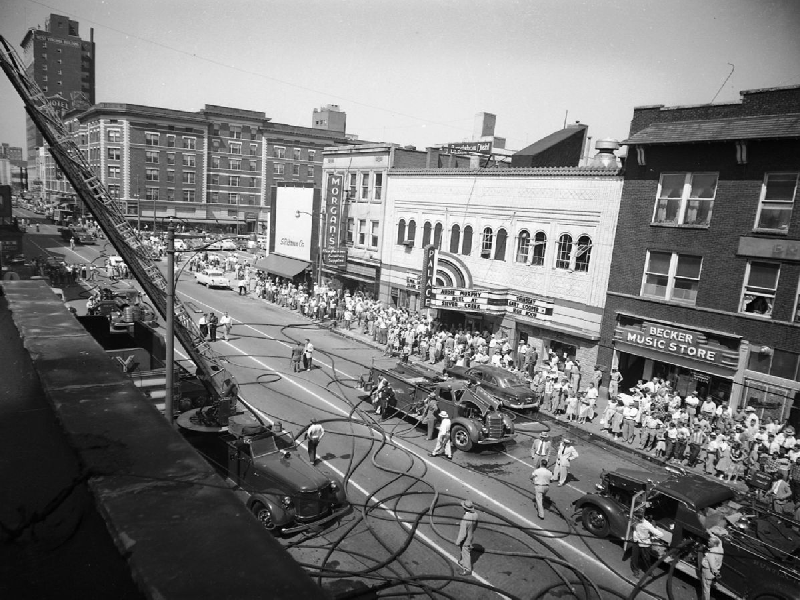
------------------------------------------------------------------------------------------------------

Courtesy of James E. Casto
----------
The Palace Theater, which opened in 1925.
------------------------------------------------------------------------------------------------------------------
A Crowd gathers on the northern side of the 1000 block of 4th Avenue to watch
Huntington firefighters work after a fire at the Roxy Theater on Aug.
25, 1952. From left, the Frederick Hotel, the S. P. Brown Co., Morgan's
Office Machines, the Place Theater (which was playing Audie Murphy's
"Duel at Silver Creek" and Gary Cooper's "High Noon") and the Becker Music
Store. The Roxy Theater, 1037 4th Ave. in Huntington, opened Aug.
31, 1933. It burned Aug. 25, 1952, according to James F. Mitchell.
The location is now a parking lot. The two movies that were playing at the
time
were "The Pride of St. Louis" and "The First Time," both starring Dan Dailey.
The the theater's owner was C. Bertram Hukle, originally from
Lexington, Ky. Atone time, Hukle owned a chain of motion picture theaters
that was headquartered in Huntington, according token Reffeitt.
"About 1949, he led a group of theater owners in a suit against the City of
Huntington, styled Hukle vs. City of Huntington, for imposing an
entertainment tax," Reffeitt said. "The same was appealed to the
West Virginia Supreme Court in 1950 which upheld the lower court's ruling
against the city." Thanks to Mitchell and Reffeitt for the information.
------------------------------------------------------------------------------------------------------------------
HUNTINGTON --
When fire destroyed a Ford auto showroom at 1030 4th Avenue in downtown
Huntington,
plans were announced for a new theater to be built on the site and
construction was started. But
financial problems stalled the work and its
uncompleted skeleton sat for three years. Finally,
the structure was purchased
by the Smith Amusement Co., which rushed it to completion.
The grandly
named Palace Theater opened Nov. 15, 1925. In a page-one article, The
Herald-Dispatch described
the new theater as "a structure of rare beauty." A box
office finished in bronze and gold and equipped for two
cashiers stood at the
center of the exterior lobby. Lobby walls trimmed in marble featured bronze
cases
to display photographs and announcement cards for forthcoming features.
One hundred and fifty girls
were interviewed and 10 hired to be uniformed
"usherettes" at the new theater.
When the
photograph printed here was shot in 1939, the Palace was showing "You Can't
Cheat An Honest Man,"
a comedy starring W.C. Fields, ventriloquist Edgar Bergen
and his dummy Charlie McCarthy. The marquee
noted that coming soon would be
"Made for Each Other," with Carole Lombard and Jimmy Stewart, and
"Stagecoach," which would prove to be John Wayne's first hit film. (Someone seems to have had
a bit of
trouble spelling "coach.") For many years, the Palace was operated by
the energetic and outgoing
John Goodno. Johnny, as he was known to one and all,
was quick with a smile - and equally
quick to tell you all about the next big
movie he had booked. He worked tirelessly to promote the
city's downtown and was
a generous friend to Marshall University, the Huntington YMCA and
other local
organizations. He retired and moved to Florida in 1967. He was 94 when he died
in 1999.
When
multi-screen theaters became the industry standard, the Greater Huntington
Theater Corp.,
which had acquired the Palace, converted its balcony into a
second
screen and renamed the theater, christening it the Camelot.
The Camelot
closed in 2006. The building is now home to
the Jeslyn Performing Arts Center, a
dance studio.
-----------------------------------------------------------
Note: This Article and picture appeared in the Herald-Dispatch Newspaper on Sep. 08 , 2014
-----------------------------------------------------------
[ Back ]